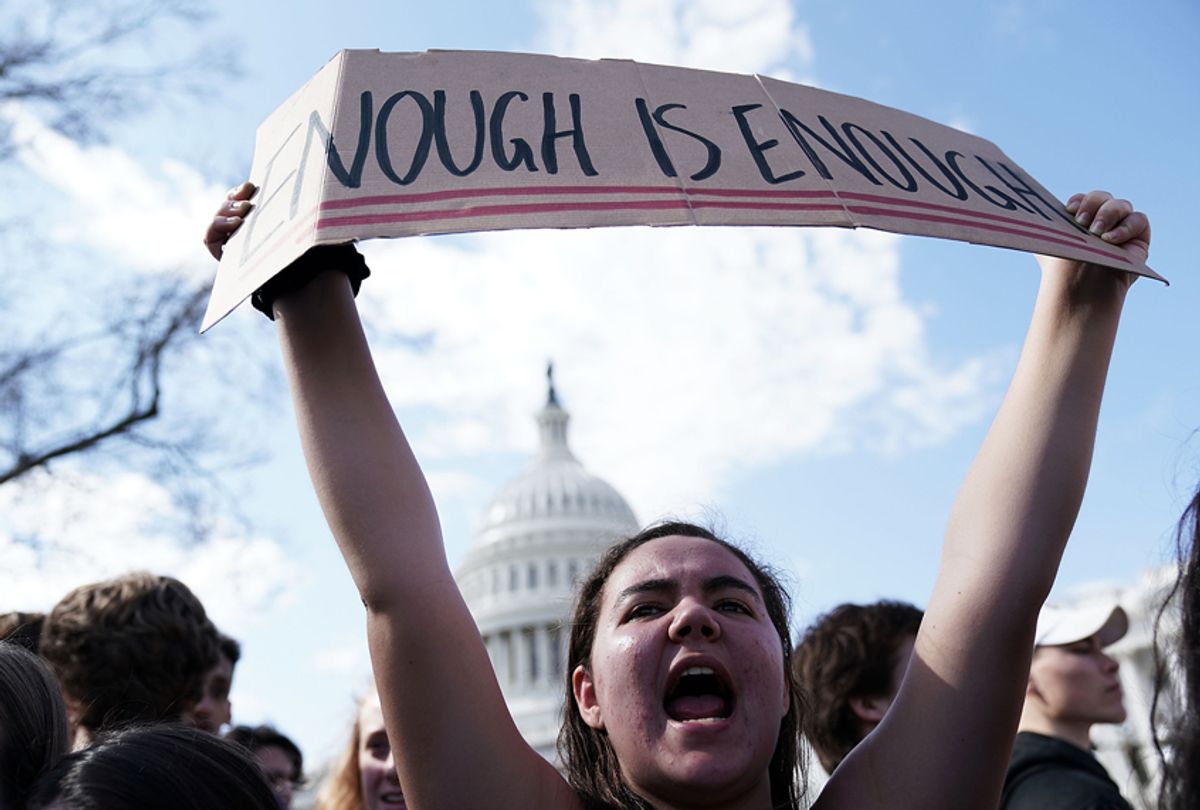They don't even have a real name yet — there's no way "Gen Z" or "iGeneration" are going to stick. But the young men and women born after 2000 have wasted zero time this year asserting that the next generation has arrived. They've basked in the glory of Olympic success, with Red Gerard and Chloe Kim becoming the first winter gold medalists born in the new century. And in the wake of the February 14 mass school shooting in Parkland, Florida, they've demonstrated they're a formidable political force. The teenagers have arrived. Thank God.
From the earliest moments that the news began trickling out of Stoneman Douglas High School, students began asserting themselves with clarity, passion and well-honed media savvy. They shared images and videos of the siege while it was still underway; they poured out their grief in real time — and they refused to be silenced or shamed for it. When conservative YouTuber Mark Dice lamented on Twitter that the students shouldn't have been Snapchatting their experience, 16-year-old Parkland survivor Sarah Chadwick shut him down and replied, "17 people are dead. 17 of my classmates. This is how you f__ing respond?"
In the aftermath, students from Parkland and around the country have rallied to demand action. Student David Hogg went viral when he made his articulate, impassioned plea to the world directly on CNN, saying, "What we really need is action. Please. This is the 18th one this year. That's unacceptable. We're children. You guys are the adults. You need to take some action and play a role."
But teens have already organized to take action as well. They've planned the March for Our Lives for March 24, a "created by, inspired by, and led by students" protest for gun safety. They've staged school walkouts and plan more, despite threats of punishment and suspension.
Over the past few days, these kids have been publicly belittled for the things they value and for the ways they communicate with each other. They've been accused of being liars and actors. And at a CNN Town Hall Wednesday night, they refused to be intimidated.
At the event, Parkland senior Emma Gonzalez confronted National Rifle Association spokeswoman Dana Loesch with integrity and intelligence, saying, "I want you to know that we will support your two children in the way that you will not. The shooter at our school obtained weapons that he used on us legally. Do you believe that it should be harder to obtain the semi-automatic and — weapons and the modifications for these weapons to make them fully automatic like bump stocks?"
When Loesch tried to steer the conversation toward mental illness, calling the shooter "nuts" and "crazy," Gonzalez retorted, "I think I'm gonna interrupt you real quick and remind you that the question is actually, do you believe it should be harder to obtain these semi-automatic weapons and modifications to make them fully automatic, such as bump stocks?"
And when student Cameron Kasky point blank asked Marco Rubio if he would "not accept a single donation from the NRA," the world watched while the slick politician squirmed.
Every generation fools itself a little that it's the only generation. It defines the world to suit itself, and then assumes its dominion over the culture will endure. It doesn't really consider much the generation coming after it, or how its successors will identify themselves in relation to all that's come before. But the next wave of Americans is already proving its mettle in unique ways.
My daughters, aged 18 and 14, spent a large chunk of their lives under America's first African-American president. They have no direct experience of the world before 9/11. They can't remember a time before smartphones or social media — even if they couldn't care less about old-person platform Facebook. They're more sophisticated and cautious in how they use it, having absorbed the hard lessons of their predecessors. They came into adolescence with marriage equality as a Supreme Court granted right for them and their friends. They know gender exists on a spectrum and don't understand why that would be up for debate. They have an expectation of diversity in the entertainment they consume. They are open about mental health issues. They are alarmed about the economy and the environment. Beyoncé's "Single Ladies" is the anthem of their playground days.
"The rise of school shootings is something we've seen throughout our childhoods," my elder daughter told me Thursday, "and that's very upsetting. It makes you angry and scared." She was 12 when Sandy Hook happened. "We have lived through Bush and Obama and Trump, and my generation has seen good leadership and bad leadership," she observed. "Social media plays a big role. Even if you're not in an environment that's not very progressive, you can find one. That's really helpful. You can see the effects that these movements have. That's very empowering."
No generation is one thing. Mine is as much Kurt Cobain as it is Paul Ryan, as much Ava DuVernay as it is Katie Roiphe. My children's will be the same. They've watched and learned from the errors of their elders, and they will no doubt make make mistakes brand new to their time. They are resilient and motivated and frightened and hilarious and really, really eager to vote. On Wednesday evening, conservative pundit Todd Starnes asked on Twitter, "Parents, what would you do if your child lectured and ridiculed a U.S. Senator on national television?" They answer is pretty clear already — we're cheering them on. Because we know they're just getting started.



Shares